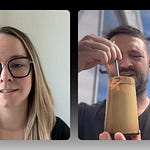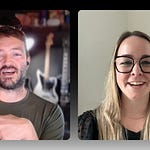The spark
Seth’s short post today: “Two Kinds of Confrontations.”
When we win by having someone else lose, we set up a conflict. It’s clear, direct, but not generative. But when we win by confronting our fear, everyone benefits. Often people who choose to battle others are actually better off looking at their fear instead.”
He’s contrasting external conflict (I beat you) with internal courage (I face what scares me). The first produces scoreboards. The second produces growth.
—
Today’s guest: Kyle Carline (OneHope)
Kyle and I have built, shipped, and occasionally commiserated together for years across digital marketing and advertising. Two fun facts: he’s a devoted West Ham United supporter and an accomplished guitarist—he even built a custom West Ham guitar and recorded a rock version of their anthem. Here’s the link his YouTube video! (West Ham marketing team, call this man!)
—
Our take (highlights from the conversation)
Win/Lose poisons teams. We all know the teammate who treats every decision as a zero‑sum contest. Even if they “win,” the group loses—trust drains, creativity shrinks, and people play defense.
Fear is the root. That win/lose posture often masks insecurity: fear of not being enough, not being seen, not being in control. Naming the fear is the unlock.
“Everyone benefits?” Kyle pushes here: facing fear doesn’t erase conflict or winners/losers. But it changes the game: we can lose the point yet still gain maturity, respect, and clarity.
Connection vs. Separation. A connected worldview looks for win/win—or at least learn/win. A separation worldview defaults to self‑protection and self‑promotion (which breeds win/lose). Check out Living Fearless by Jamie Winship and Identity Exchange
Short posts, deep cuts. The smallest “Godin cookies” force us to supply the meaning. That discomfort is part of the work.
—
A simple playbook to shift from “beat them” to “face it”
Lead with confession. Start meetings with one sentence naming a fear: “I’m worried I don’t know enough for this stakeholder.” Confession disarms posturing.
Set a shared aim. Write the team’s Objective & Why in one line. When the aim is visible, opponents become partners.
Swap metrics. For tough work, track trust, learning, and momentum alongside time/budget. Generativity needs different KPIs.
Choose curiosity over combat. If you feel the urge to “win,” ask two questions before arguing: “What am I afraid of?” and “What might I be missing?”
Debrief without villains. After conflict, run a blameless retro: What happened? What did we learn? What will we change next time?
—
Try this this week
One fear, out loud: Share a relevant fear at the start of your next collaboration. Notice how the room changes.
One reframed conflict: Take a current win/lose debate and restate it as a shared problem to explore.
One tiny retro: After your next decision, write two lines: What I did / What I learned.
—
Why it matters
Score‑keeping makes quick work; courage makes good work. Teams that face fear together ship better products, build real trust, and stay in the game longer. That’s generative leadership.
—
Your turn
Where are you currently stuck in a win/lose frame—at work, at home, or on your team? What fear might be hiding underneath, and what’s one step you can take to face it this week? Share in the comments—let’s learn from each other.















